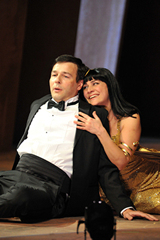| Opera Reviews | 5 May 2024 |
Giulio Cesare came, saw and conqueredby Moore Parker |
|
| Handel: Giulio Cesare Salzburger Pfingstfestspiele 27 May 2012 |
|
|
Revamped, the word "triumph" is surely the appropriate choice to meet Cecilia Bartoli's string of successes at this year's Whitsun Festival - not just just as a significant contributor in various performances, but in her first season here as Artistic Director. With "Cleopatra" as the Leitmotiv for this season, Handel's Giulio Cesare in Egitto is hardly a surprising choice. However, even those sceptics who feared a Baroque opera of Wagnerian dimensions (five hours including the two intervals) must have found the cast tantalizing on paper - and subsequently in practice. Above all, the playing of Il Giardino Armonico under Giovanni Antonini - which throughout the evening spanned an unlimited gamut of emotion with supreme technical prowess, including an unusually virtuoso contribution by the natural horn section. Circumstances and fashion have determined a motley mixture of gender choice and vocal categories in this work down the years, with the title role alone undertaken in recent times by singers as varied as Walter Berry and Janet Baker. This production opts for no fewer than four counter tenors in the cast - each chosen with well-considered idiosyncrasies to aptly complement their allocated characters in three of the male and one of the female parts. In the title role, Andreas Scholl demonstrated an enviable evenness of tonal production and accuracy, while creating a pertinent tongue-in-cheek mix of a blue-suited Central American dictator and a Brussels technocrat (complete with EU-logo briefcase) who appears and exits in an English chauffeur-driven limousine. As his conquering mistress, Cecilia Bartoli exuded an infectious sense of fun and ease, both vocally, and in her coy yet vampish stagework. The voice remains soft-grained, fluid, and in control throughout, and she displayed a fine legato and sense of poise in the role's more pensive moments. In captivation, and mourning her fate, her testing third act aria "Piangero la sorte mia" was poignantly sung with her head covered by a cloth hood - yet remaining in absolute harmony with the pit both in tempi and mood. Anne Sofie von Otter, as the elegant and statuesque Cornelia showed ample evidence that indeed her vocal and artistic "...summer shall not fade," flawlessly shaping Handel's wonderful lines, and contributing to one of the musical highlights of the evening - her duet with Sesto which closes Act One. Perhaps the greatest progression - both characterwise and vocally - of the evening was Philippe Jaroussky's Sesto. The awkward juvenile in short pants and long socks gave way to the avenging man, with appropriate vocal colours, dynamics and demeanor which won the audiences attention and hearts as the evening progressed. In apt and superb contrast, Christoph Dumaux's Tolomeo showed a wry mix of deceit and lust. His lithe, rather serpent-like figure and metallic vocal timbre ideally suited the spiky character. Ruben Drole's somewhat roughly-hewn baritone and bearish demeanour well-fitted the boorish Achilla, while Peter Kalman convinced as a solid Curio. Special mention also of Jochen Kowalski's delightful portrayal as the handmaiden, Nirena - fresh of voice, and a true testament to years of skilful stage craft. This part of the world is accustomed to mixed receptions when it comes to production teams - but seldom one so unconstrained and vehement as on this evening, both during the performance and at the final curtain where all but a riot broke out. In their first stage production of a Handel opera, Moshe Leiser and Patrice Caurier displayed much craft and skill in clearly articulating the material to hand and in the guidance of their protagonists, who unfailingly complimented both the action and the spirit of score. The Pandora's Box setting is full of fantasy, encompassing life-sized dolls (Caesar's effigy and some of the "soldiers") through a disused oil drum in which to cremate Pompeo's severed head, the above-mentioned limousine, and so on - often introducing irony and humour. One can but smirk as Cornelia attempts at suicide by placing her head in an enormous alligator's jaws, as too at Cleopatra's airborne moment as she embarks on her mission to Caesar suspended on a life-sized missile. In all, the long and involved plot was clearly spun - often to good effect, and generally with a sense of entertainment value. I would have welcomed a somewhat more festive finale, but perhaps the slightly damp squib jaunt around the grand piano with a glass of bubbly was in itself a statement on the presumed gratification of success in power and love. A revival of five performances is scheduled in this Summer's Salzburg Festival. |
|
| Text ©
Moore Parker Photo © Hans Jörg Michel |

 "He
came, he saw, and he was conquered" introduces one of the articles in
the lavish programme which accompanies this production.
"He
came, he saw, and he was conquered" introduces one of the articles in
the lavish programme which accompanies this production. 





